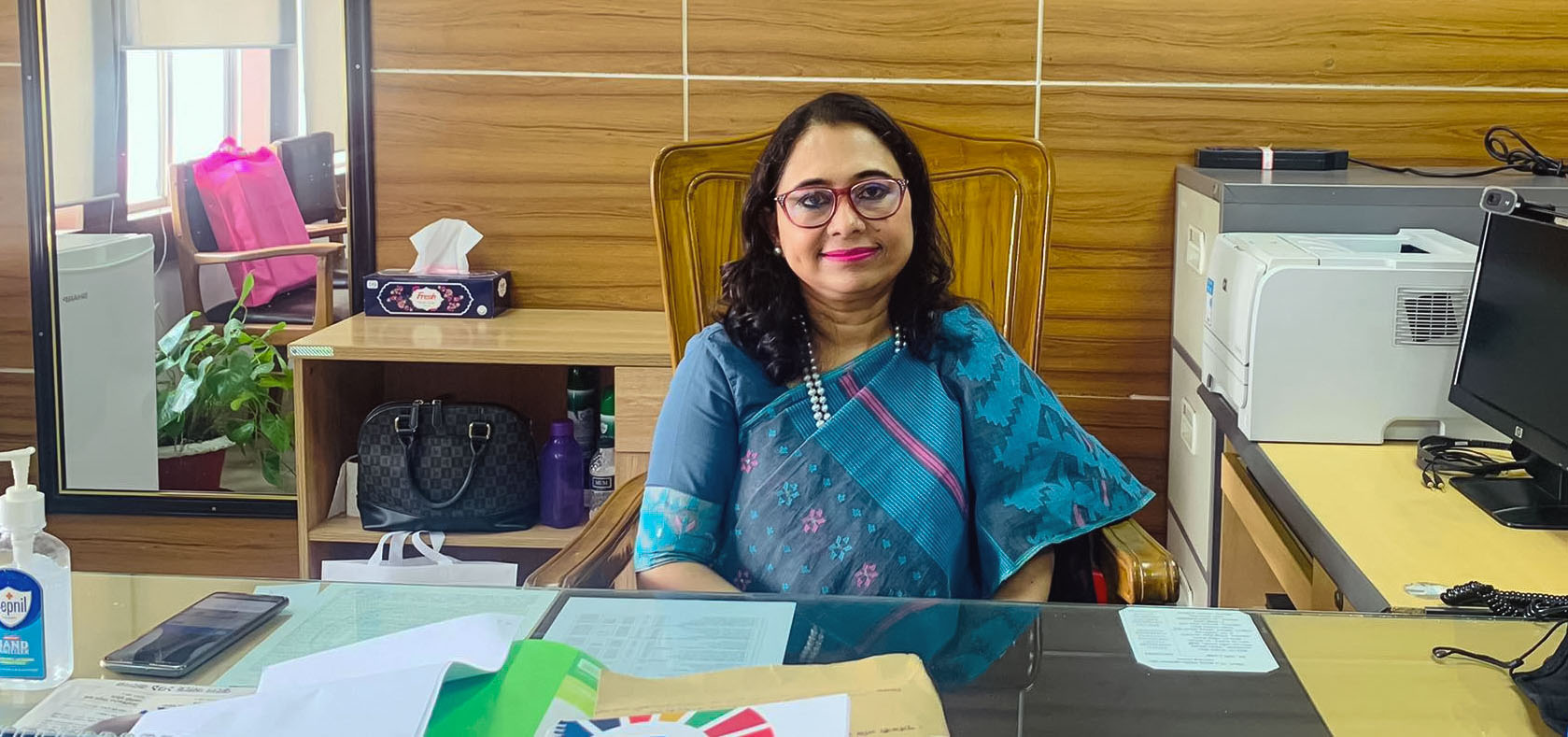Take five: “To reach the most marginalized, especially women and girls, we need data, so we can make our policies comprehensive and implementations inclusive”
Date:
Author: Shararat Islam

Keya Khan is Additional Secretary, Ministry of Environment, Forest and Climate Change of the Government of Bangladesh. She was interviewed in her office in Dhaka by Shararat Islam of UN Women.
This year’s International Women’s Day theme is, “Gender equality today for a sustainable tomorrow”. How can we ensure gender equality and empowerment of women in the context of climate change, environmental and disaster risk reduction policies, and programmes?
Women constitute half of the global population. So without their involvement and empowerment, we will lose half of the probable opportunities and achievements.
The impacts of environmental degradation and climate change are more severe for women than men due to the unequal power balance, which leads to social and economic vulnerabilities, lack of access to information and services, and lack of agency for decision-making. Women share the greater burden of the work at all levels, for instance, managing the household and unpaid care burden while also working to contribute to the economy in diverse sectors. Moreover, after any disaster women are at higher risk of sexual violence, exploitation and abuse, trafficking, and domestic violence. Therefore, it is of utmost importance to ensure gender equality and women’s empowerment in the climate-vulnerable context that we are living in today.
Bangladesh has demonstrated strong leadership in acknowledging the risks posed by climate change by making adaptation and disaster response central pillars of its national development framework. How does the Government plan to implement this to address the needs of vulnerable groups that are disproportionately impacted?
The Government of Bangladesh is addressing climate change with multiple policies and plans to bring in sustainable and strategic solutions.
We updated the Bangladesh Climate Change and Strategic Action Plan and “nationally determined contributions” in 2021. The Government formulated the National Adaptation Programme of Action in 2005. Now the Ministry of Environment, Forest, and Climate Change is finalizing the National Adaptation Plan (NAP) where health and gender are being considered as important cross-cutting sectors along with agriculture, water, coastal zones, urban areas. The finalization process is done through a widespread consultation at local, district, divisional and national levels. Vulnerable and marginalized communities and groups are being consulted, so their needs and suggestions are reflected in the NAP-recommended projects and programmes. In addition to this, with the help of UN Women, the Climate Change Gender Action Plan formulated in 2013 is now being updated with an aim to support the Government to ensure gender-transformative climate action.
How is the Ministry of Environment, Forest, and Climate Change ensuring adaptation of gender equality-oriented approach in climate change mitigation?
As a developing country, Bangladesh has limited emission reduction or mitigation activities. But women are taking the lead in using improved cookstove and solar home systems, which is commendable. We are focusing on women’s leadership and participation in one of our key initiatives – countrywide social forestry, which is simultaneously an adaptation and a mitigation activity. More than 50 per cent of the beneficiaries are women, who actively participate in this program to reduce carbon emissions.
What policies and actions are needed to protect and empower vulnerable groups, especially women and girls who are disproportionately impacted by climate change?
We have all the policies and plans but we need to implement these policies into action. We need to ensure that appropriate monitoring mechanisms, including clearly articulated indicators, are in place to achieve our desired targets. To reach the most marginalized, especially women and girls, we need data, so we can make our policies comprehensive and implementations inclusive. We appreciate UN Women’s technical support in piloting a survey in partnership with the Bangladesh Bureau of Statistics to collect sex-, age- and disability-disaggregated data on climate change adaptation and disaster risk reduction in the three most climate-vulnerable areas in Bangladesh. Such combined efforts need to be scaled up to address the needs of vulnerable groups.
What are your recommendations on mainstreaming gender equality in climate change policies and strategies? In light of the draft agreed conclusions at the 66th CSW (Commission on the Status of Women), how can Bangladesh advance their implementation to bring a sustainable change in the lives of women and girls?
I will highly emphasize ensuring climate finance disbursement for vulnerable countries with a gender lens. We have gaps in sex-disaggregated data, so my other recommendation is to ensure the availability of disaggregated gender data to utilize the gender budget efficiently.
The draft agreed conclusion has covered and reaffirmed most of the areas to address gender equality and empowerment of women. This affirmation will positively impact our actions to bring change in the lives of women and girls of our country. However, under the leadership of Honorable Prime Minister Sheikh Hasina, the Government of Bangladesh has already made significant achievements in women’s empowerment. As the Commission calls upon the United Nations system entities and other relevant international financial institutions to support the Member States, we hope we will have sufficient climate-vulnerable funding to increase and strengthen our programmes to improve the lives of women and girls vulnerable to climate change.